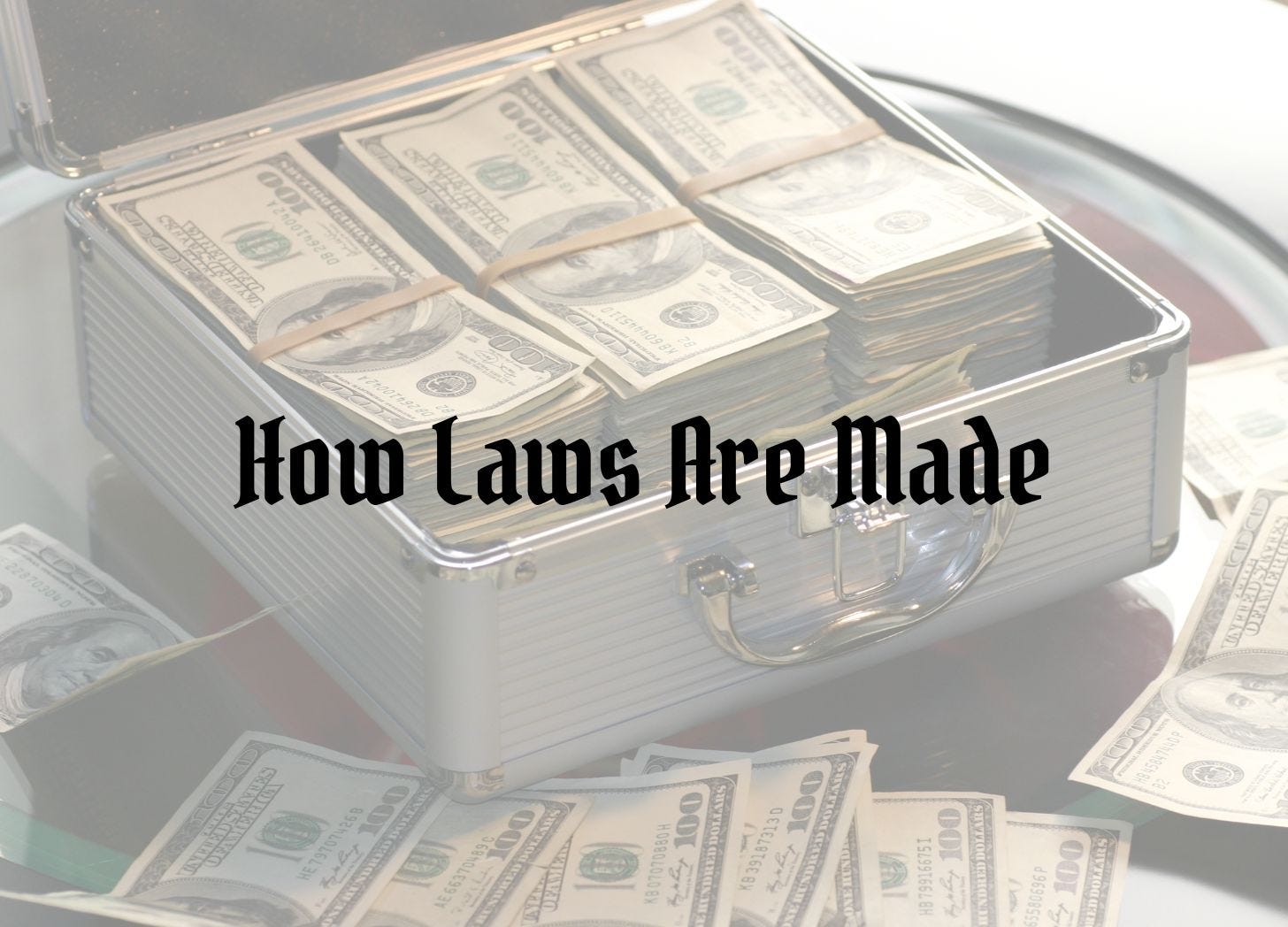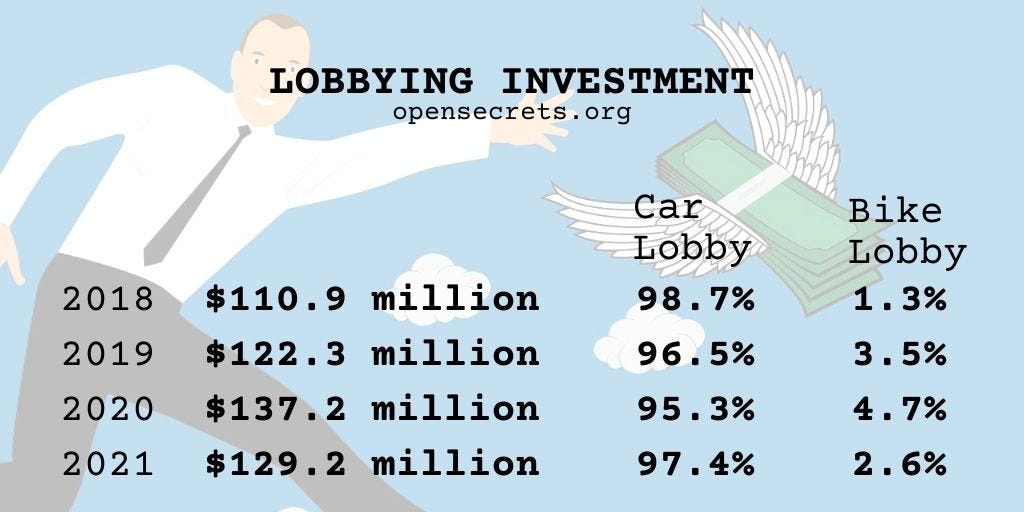Road builders buy another bill
You get what they pay for. Transportation policy and infrastructure is determined by what the most influential lobbyists spend their resources on.
If one of the old investigative journalism shows was publishing a story on this topic, they’d probably call the segment Power Play: How Lobbyists Shape Transportation Infrastructure. The grandfatherly voice would open up with, “The corridors of power are often unseen, but their impact is felt by all.” Dun dun dunnnn.
It’s kind of their thing to sound over the top, but lobbying certainly deserves that sort of big voiced you-won’t-believe-what-comes-next vibe. Lobbyists collect money from clients in order to buy legislation. In the olden days, they would stand in the Capitol lobby like some kind of high-stakes trading post.
Transportation lobbyists have long been players in the political arena. By funneling substantial sums of money into campaign contributions, road building contractors, truckers, civil engineers, labor unions—they all want access to decision-makers and key influencers so they can shape legislation to their advantage.
Let’s Buy a Bill
From leveraging personal relationships to funding political campaigns to offering miraculous investment advice, a lobbyist’s objective is to sway decisions in favor of their clients. Their reach extends to drafting legislation, providing input on regulations, and shaping the allocation of funds for infrastructure projects.
Details about this stuff are accessible all over the internet. Here are the best places to start:
Lobbyists spent $267 million on issues related to ground transportation in 2021, making it the 6th most lobbied sector in the United States. When you carve out the chunks spent by the car lobby and bike lobby, here’s how it looks:
$267 million in a single year helped the ground transportation lobbyists win 72% of the bills they were trying to get authorized. Think about that win rate—they get what they want 3 out of 4 times.
The top 10 spenders in 2021 were:
American Trucking Associations ($18.5 million)
United States Chamber of Commerce ($16.5 million)
National Automobile Dealers Association ($15.5 million)
American Public Transportation Association ($14.5 million)
Railway Supply Institute ($14 million)
American Road & Transportation Builders Association ($13.5 million)
FedEx Corporation ($12.5 million)
Uber Technologies ($12 million)
Lyft ($10 million)
National Highway Traffic Safety Administration ($10 million)
When you hit #10, I hope you heard the sound of a record scratch. NHTSA, a government agency, is paid by the government to lobby the government. They’re the agency responsible for safety regulations, including life-or-death issues like truck underride crash prevention and automaker recalls. You know, the issues that those top lobbyists don’t ever want to see brought before Congress.
The feds are paying NHTSA to push for policies that improve safety. And NHTSA’s recommendations are heavily influenced (sometimes even drafted by) trucking and automotive lobbyists. I know, they don’t teach about widespread corruption in the kids’ cartoon about how a bill is made.
NHTSA isn’t alone. The FDA, FTC, EPA, SEC, FCC…name an industry, and there’s a government agency that gets paid by the government to lobby the government.
This PBS documentary scratches the surface of the lobbying’s influence on transportation safety.
Is lobbying good or bad?
Yes. Lobbying is the art of persuading and influencing policymakers to shape laws, regulations, and policies in favor of specific interests. Lobbyists act as intermediaries to policymakers. Their influence is measured in terms of financial contributions, personal relationships, and the nature of their expertise. But the thing that really matters is the legislation that gets passed or scrapped.
The auto-oriented groups are by far the most funded, so they have the most influence.
You know I have a bias for healthy neighborhoods. You know what it takes in modern America to abolish unhealthy policy that leads to junk infrastructure? Lobbying. I don’t see how that’s avoidable in the short term.
Lobbying creates winners and losers.
Winners are generally the large corporations and politicians. The percentage of congressional politicians who get into lobbying jumped from 3% to 50% just in my lifetime. When you include indirect policy-influencing jobs, the number is close to 60%. It’s even more skewed in transportation, with close to 2,000 registered lobbyists, nearly 70% of whom previously worked in government.
Losers are generally the people trying to reduce the number of Americans being injured or killed as a result of transportation policy.
I don’t know if money makes the entire world go round, but it definitely makes or breaks political careers. Campaign donations, super PACs, and corporate-funded think tanks all play a role in greasing the wheels of influence. It’s not a coincidence that “public servants” at the national level are able to live so lavishly. They’re rewarded based on their votes.
Of course lobbyists do provide valuable insights to policymakers, helping them make informed decisions. They write the tl;dr summaries for elected leaders. It’s not all “show me the money” antics.
Whether or not lobbying should exist at all is a worthwhile conversation. But for you and me, right now in today’s environment, it helps to at least be aware of lobbying’s purchasing power.
I do have some ideas about ways to influence politicians outside of traditional lobbying. Those are coming soon.
Before you click away…
When you refer friends to Urbanism Speakeasy, you’ll get special perks and freebies.
1. Share Urbanism Speakeasy. When you use the referral link below, or the “Share” button on any post, you'll get credit for any new subscribers. You can send the link in a text, email, or share it on social media with friends.
2. Earn benefits. When more friends use your referral link to subscribe (free or paid), you’ll get perks.
Get 1 month behind the paywall for 2 referrals
Get 3 months behind the paywall for 10 referrals
Get 6 months behind the paywall for 20 referrals + Bicycle Buddha Oracle Deck



